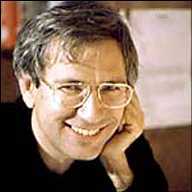
Pamuk comes in highly recommended, besides being the most recent Nobel Prize winner for Literature. He was on my to-read list for over a year, but it was only after his novel "Snow" was singled out for recognition did I finally get down to reading him. This may have something to do with the fact that he writes in Turkish, and therefore his novels are translations. Of recent, I have developed a mental block toward translated novels; Garcia Marquez's novel "Memories of my Melancholy Whores" being my first victim. Pamuk's Snow is yet another such translation; a novel I therefore picked with some reservations. Having decided to read it, I have to admit that it was quite the page-turner for the first hundred pages or so. When a novel starts off at that frenzied level of anticipation, it creates problems for itself; those of sustainability. The author has to now maintain the same level of excitement in the reader for the remainder of the novel. I'm not sure Pamuk succeeds in doing that in "Snow". The delirious excitement of the first few chapters subsides steadily into a figure-out-who-I-am session.
What really drew me into the story was its setting; Anatolia, a peninsula of Western Asia in Turkey which is part Asia and part Europe, the Asian part being the larger . The interplay of dynamic characters in an ethnically diasporic setting always makes for a unique reading experience; and "Snow" was that. The characters, so very different and yet displaying and experiencing universal human emotions of anger, jealousy, greed, and pride, makes the reader forget the geographic and ethnic borders that divide Turkey, a country that straddles between its secularist identity and its ancient Islamic heritage. In fact, at the very outset, the reader embarks on a journey that showcases this split. It is a journey that the reader takes on with the main protagonist Ka to his homeland Kars, a place from where Ka'd been exiled twelve years ago. Ka has now been invited by an old friend to report on a spate of suicides among young Muslim girls prevented from wearing headscarves in school.
Mentally taxing though at times, but the wide array of characters that Pamuk generates in the context of the story is remarkable, definitely a mark of a master story teller with a restless imagination. As Pamuk himself admits, "I have this urge to stop this life and start afresh," he says. "I am in a train, and the train goes into a town, or it passes close to houses. ... You see inside the house where a man, a family, a TV is on, they're sitting at a table. You see a life there. There's an immense impulse to be there, to be them, to be like them." That is exactly what he does in the novel; each character is unique with a life of its own that could well have been spun into another story, but Pamuk leaves you with but a taste, and wanting for more.
The evasive nature of the novel and its characters is reflective of Pamuk's own unwillingness to be pinned down, his restlessness at being unidimensional in his ethnic identity, his political views, or then his characters. For example, Pamuk's chief protagonist, Ka, is hard to hold on to. It is easier for the reader to be one with Ka's journey than with Ka himself. This inconsistency in Ka's character is like a dual edged sword that lends Ka, the poet, his credibility; yet, it also takes away from Ka because the reader is unable to empathize with him. It is this very dichotomy that Orhan, a friend of Ka in the novel (possibly the writer Pamuk himself) lays bare to reader scrutiny at the end of the novel. It's almost as if Pamuk wanted the reader to be the judge of what Pamuk had so vividly yet dipassionately presented in his story.
The reader comes away wondering whether this was but a cerebral merengue for a politically erudite brain or did Pamuk have a message to convey through the novel. Was Pamuk trying to promote Turkey's bid to join the European Union, a move Pamuk has openly supported? Or is he raising public awareness of the slow but sure insurgence of radical Islam into the Turkish psyche? Is he exploring the role of Art in a nation in the throes of political, economic, and religious turmoil? Or then, is it as the title suggests, a philosophic perspective on 'snow' wherein Pamuk studies the anatomy of a snowflake and develops it into a symbol such that, "Everyone has his own snowflake; individual existences might look identical from afar but to understand one's own eternally mysterious uniqueness, one has only to plot the mysteries of his or her own snowflake".

13 comments:
Kind of sounds like a mystery for the individual mind to solve?
A great writer..
Was passing by and your finicky mind's anatomy arrested me. this was a very sincere criticism of a work of fiction. you have pulped the whole fiction into a nutshell. Thanks for generating interest in PAmuk. Am starting to want to grab it and got hrough ti to find an answer to the questions popped by you.
Very well written. Sigh.. I might read it some day. Weren't the Turkish govt going after Pamuk for his comments about the Armenian genocide?
What is posted in the last paragraph is very interesting-spotting one's own uniqueness. If there was enough time to read fiction.
Pamuk had been on my to-read list for some time too. And it still is!
I'll make it someday
The last para has interesting observations. Authors always run into trouble when they try to insinuate their political agenda. I seriously think that i too should have a reading list now :)
Sustainability seems like a problem for every author.But I'll tell ya, he may really stink at those 55-word essays. The book seems to touch on identity in Asia Minor, I've never thought about it. That's just one reason to buy the book. My Turk history is poor, but I know Westernization started in the late days of the Ottomans, and then came Ataturk, who bought a nice flavor of both religion and culture, which defines the Turks. This is fascinating, that today, that identity is a challenge. Is the Turk identity itself in danger in the wrestling match between Islam and the West?
"There's an immense impulse to be there, to be them, to be like them."
i guess i would read this book for this one line alone...
yea translation can be disappointin at times.. one of the reasons why tagore is shadowed in the west is that, there has never been a proper translation of sort of any of his works..
i ve read garcia's 100 years of solitude.. that was a translation too.. but that was good..
the problem is, each language has a seperate category of his own..so if i say 'the cat bit a tiger' it doest really convey anything to you. but if u wud understand my reg language, there is an underlying meaning to that..
there are some words or usages or idioms which cant be, at times, explained in english.. you dont get a sudden replacement there. that creates confusion in the minds of the reader..
but i guess i shud sill read this book and tuesdays with morrie too, its been pending for so long!
lash,
I haven't reviewed this novel on my blog because I read it some few years ago, but 'Tuesdays with Morrie' is one novel of Albom I'd recommend with no reservations whatsoever.
khakra,
"Is the Turk identity itself in danger in the wrestling match between Islam and the West"?
That's an interesting point about an 'independent' Turk identity that you bring up; one that is neither just European nor just Islamic, and one that I most certainly want to find out more about.
Recently I read this interview of Pamuk's given to the German newspaper Die Zeit on 14 April, 2005 and I found these interesting references to this 'Turk' identity you mention:
"Another factor, one often underestimated by the West, is that the fall of the Ottoman Empire left behind such devastating sadness that it was long impossible to come to terms with the experience. The reaction to this traumatic loss of empire was to retreat into oneself. Faced with the challenge of Western thinking, people tend to focus on themselves and chant like a Sufi:
we are different, we will always be different and we are proud to be different.
...the inner conflict of Turks today, the contradictions between Islam and modernity, the longing to be part of Europe - and the fear of it at the same time.... This nation has been rehearsing the transition from one civilisation to another for 200 years, and I can safely say that it is a tortuous experience...The average Turkish citizen longs to join the EU and at the same time, he longs to see his traditional Turkish identity strengthened."
I meant to come by sooner...
but was not feeling so great!
Thanks so much for your visits, and nice comments!
So much appreciated!
This is a very good post on Pamuk!
Thank you!
Take care!
Margie:)
thank you for your concern. may be i should write when i know half of what you do..till then reading is a wiser option..
Post a Comment